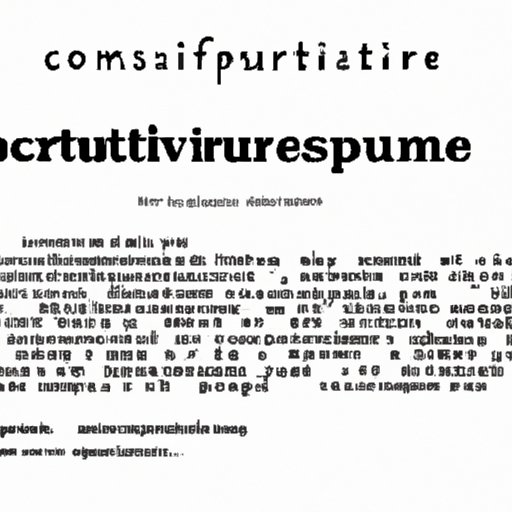Introduction
Subordination in writing is a technique used to create logical connections between ideas and link them together. It involves using subordinate clauses or phrases to join two independent clauses in a sentence. The subordinate clause provides additional information about the main clause and helps make the sentence more meaningful.
In this article, we’ll explore what subordination is, the different types and uses of subordination, the benefits of using it in your writing, and how you can use subordinate clauses to craft cohesive sentences.
The Benefits of Subordination
Subordination is an important tool for writers as it helps to clarify their ideas, improve flow and structure, and create logical connections between sentences. Here are some of the key benefits of using subordination in your writing:
Clarity and Flow in Writing
Using subordination in your writing can help to make your ideas clearer and easier to follow. Subordinate clauses provide additional information about the main idea, which makes the sentence more meaningful. Furthermore, using subordination can also help to make your writing more fluid and cohesive by creating logical connections between sentences.
Crafting Cohesive Sentences
Subordinate clauses can be used to craft sentences that are more concise and meaningful. They can help to reduce the number of words needed to express an idea, while still providing all the necessary information. By using subordinate clauses, you can also make your sentences more cohesive and structured.
Logical Connections in Writing
Subordination can also be used to create logical connections between sentences. For example, if you want to explain how one event led to another, you can use a subordinate clause to connect the two ideas. This makes your writing more organized and helps the reader to understand the relationship between the two events.

A Guide to Subordinate Clauses and Phrases
Now that we’ve discussed the benefits of using subordination in your writing, let’s take a look at what exactly a subordinate clause or phrase is. A subordinate clause is a group of words that contains both a subject and a verb, but does not express a complete thought. It relies on the main clause for its meaning and cannot stand alone as a sentence.
A subordinate phrase, on the other hand, is a group of words that contains a single verb or noun, but does not contain either a subject or a verb. It also relies on the main clause for its meaning and cannot stand alone as a sentence.
Understanding Subordination
Now that we’ve defined subordinate clauses and phrases, let’s take a look at what writers need to know about using them. When using subordinate clauses, it’s important to remember that they must be placed after the main clause in the sentence. This helps to ensure that the main clause is clear and understandable.
It’s also important to keep in mind that subordinate clauses should not be used too often in a sentence. Doing so can make the sentence difficult to read and understand, as well as detract from the main point of the sentence.
Common Mistakes to Avoid
When using subordinate clauses, it’s important to avoid common mistakes such as mixing up the order of the clauses. This can lead to confusion and make the sentence less effective. It’s also important to make sure that the subordinate clause is relevant to the main clause, as otherwise it may detract from the meaning of the sentence.
Crafting Cohesive Sentences with Subordinate Clauses
Now that we’ve discussed the basics of subordination, let’s take a look at how you can use subordinate clauses to craft cohesive sentences. Here are some tips for writing clear, concise sentences with subordinate clauses:
Tips for Writing Clear, Concise Sentences
- Start with the main clause and then add the subordinate clause.
- Make sure that the subordinate clause is relevant to the main clause.
- Avoid using too many subordinate clauses in a sentence.
- Use commas to separate the two clauses.
Examples of Effective Use of Subordinate Clauses
Here are some examples of effective use of subordinate clauses:
- I went to the store, although I didn’t need anything.
- She was tired because she had been working all day.
- He did not want to go, even though his friends were going.
- We decided to go home after the movie ended.
Conclusion
Subordination in writing is a useful tool for writers as it helps to clarify their ideas, improve flow and structure, and create logical connections between sentences. It involves using subordinate clauses or phrases to join two independent clauses in a sentence. Subordinate clauses provide additional information about the main clause and help make the sentence more meaningful.
By using subordination in your writing, you can make your ideas clearer, create cohesive sentences, and make logical connections between sentences. It’s important to remember to place the subordinate clause after the main clause, to make sure that it is relevant to the main clause, and to avoid using too many subordinate clauses in a sentence.
By following these tips and using subordinate clauses effectively, you can improve the clarity and flow of your writing and make your sentences more meaningful and powerful.
(Note: Is this article not meeting your expectations? Do you have knowledge or insights to share? Unlock new opportunities and expand your reach by joining our authors team. Click Registration to join us and share your expertise with our readers.)
